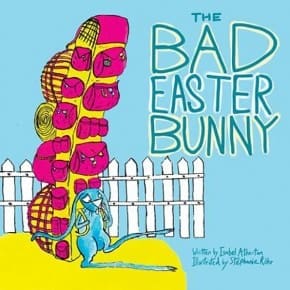
You think the Easter Bunny is cute and sweet? You haven’t met BEB, aka the Bad Easter Bunny! He will eat all your candy, break all your toys, and trash your neighborhood. We’re talking no more Mr. Nice Bunny!
Every spring the Easter Bunny frolics through every neighbourhood in every city to hand out candy and toys to children. The problem is he feels a total lack of gratitude from them. He’s getting sadder and sadder, and in turn his once bright-pink fur has gone a depressing shade of blue. His fur really does reflect how he is feeling inside. When a group of highly excitable children knock him to the ground, he sees all of the colors of the rainbow and settles on a hopping red color. The Easter Bunny is furious! He’s tired of being taken for granted and has decided to become the Bad Easter Bunny.
He sets about smashing toys, eating all the candy, and making a big mess of the neighborhood. But a simple “thank you” from one little girl on a scooter makes the Bad Easter Bunny regret his actions. A small hug and sharing a piece of candy makes the Easter Bunny turn a happy pink, and he promises to be bad no more. In this fun and quirky children’s book, Isabel Atherton’s story and Stéphanie Röhr’s magical illustrations show how one good bunny turned very bad—and how important gratitude can be.
When the Easter Bunny is in a funk—say, after children “greedily grab the toys, sweets, brightly colored chocolate eggs, and delicious candy” that he brings—he literally turns blue. And when he gets fed up and becomes the “Bad Easter Bunny,” his fur becomes red, his teeth sharpen into fangs, and his eyes gleam with anger. French illustrator Röhr gleefully depicts the rabbit’s tantrum as it yells at passersby and destroys Easter goodies, and while Atherton overdoes the ending a tad (“the Easter Bunny realized that being bad will not solve your problems and that ‘thank you’ are the nicest words in the world”), children should still giggle over this good bunny gone bad. Ages 3–6.
– Publishers Weekly
“As one of the great professionals in our industry, Isabel is a full-service agent who provides top-notch mentorship and guidance with each new project. Indeed, she is the kind of agent and coach who challenges her writers to aim ever higher as they pursue their craft.”
Kenneth Womack, Creative Authors Client